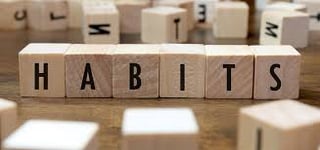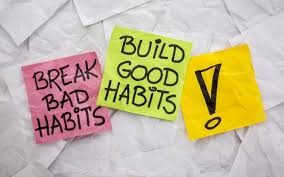 In a previous article on the power of habits, we discussed how habits are a tool our brains use to be more efficient. Instead of consciously analyzing every situation, thinking about various courses of action, and then deciding what to do, we use habits to automatically do this or that to save time. In theory, this allows us to decide to use our brain power to focus on things that really matter and really do require conscious deliberation. This is sometimes a good and sometimes a bad thing. It’s good when the habit is brushing our teeth each morning and night, or looking both ways before we cross the street. It’s bad when we grab a few cookies without even thinking about it when we are bored, or react negatively to constructive feedback.
In a previous article on the power of habits, we discussed how habits are a tool our brains use to be more efficient. Instead of consciously analyzing every situation, thinking about various courses of action, and then deciding what to do, we use habits to automatically do this or that to save time. In theory, this allows us to decide to use our brain power to focus on things that really matter and really do require conscious deliberation. This is sometimes a good and sometimes a bad thing. It’s good when the habit is brushing our teeth each morning and night, or looking both ways before we cross the street. It’s bad when we grab a few cookies without even thinking about it when we are bored, or react negatively to constructive feedback.
Improving Academic PerfORMANCE
Learn how to improve yourself through targeted learning and improved study skills.
Posts about study strategies:
Using the Science of Habits to Improve Performance in School: Part I
 We write a lot on this blog about how academic success (and other types of success) is much more a function of the choices you make and the effort you put in than a function of your intrinsic or genetic talents. In other words, most recent research suggests, and we firmly believe, that academic skills are built through practice and success comes through developing better strategies and making better choices.
We write a lot on this blog about how academic success (and other types of success) is much more a function of the choices you make and the effort you put in than a function of your intrinsic or genetic talents. In other words, most recent research suggests, and we firmly believe, that academic skills are built through practice and success comes through developing better strategies and making better choices.
Finding Your Inspiration

In a previous article The Underestimated Power of Practice, we talked about the power of practice when considering what makes someone an expert in any given subject. We explored the idea that genes aren’t as essential as we tend to believe, that an incredible amount of concentrated practice is a much better determinant of future success. We argued that talent is overrated, and practice is underrated. We talked about a rule that researchers on performance have developed – you may need to spend 10,000 hours practicing intensely and deliberately to become a world-class athlete, musician, or mathematician.
10,000 hours. 10,000 hours of ‘deep practice’ seems to be the rule to live by when desiring to become a world-class expert at something. When you begin to really consider that, it’s overwhelming. Now, you of course don’t need to spend 10,000 hours to build certain types of skills for specific events. It either isn’t necessary, or isn’t practical. But, the point is that you need to spend a lot of really intense, focused time practicing and pushing yourself to improve.
